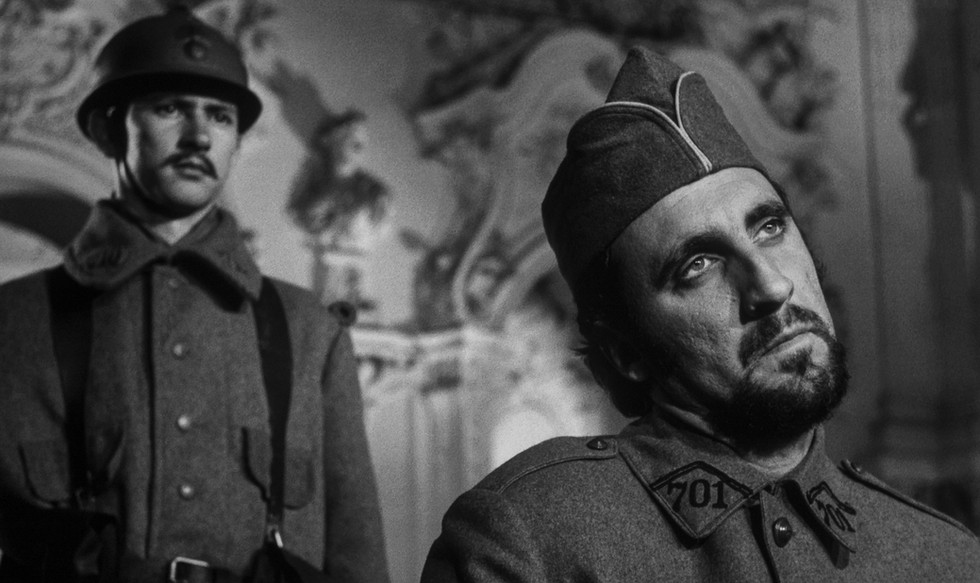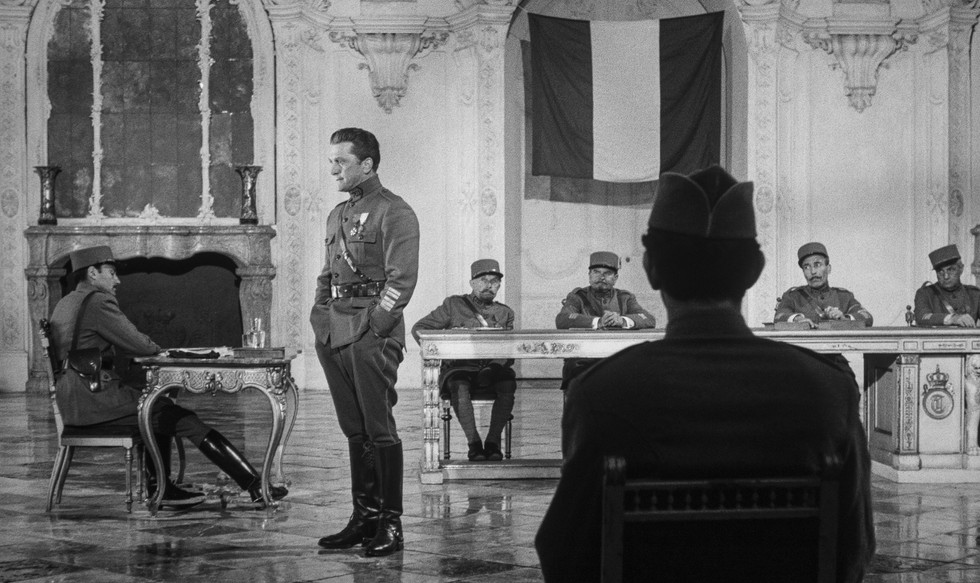4K ULTRA HD REVIEW / HDR FRAME SHOTS

Kirk Douglas stars as Colonel Dax, a former criminal lawyer and a commander of three regiments on the French front lines during World War I.
(Click an image to scroll the larger versions)
“PATHS OF GLORY”
4K Ultra HD; 1957; Not Rated
Best extra: Commentary with novelist and critic Tim Lucas
WHILE British director David Lean was in Sri Lanka filming his epic World War II Oscar winner, “The Bridge on the River Kwai,” American director Stanley Kubrick was in Germany making a much smaller war film, “Paths of Glory,” considered one of the best of the anti-war genre. Both were highly praised by critics when they premiered in 1957. “Paths of Glory” opened on Christmas Day in New York City, but received an earlier September screening in Munich where the entire production was filmed.
At first, nobody in Hollywood wanted to finance “Paths of Glory” when Kubrick and co-writers Calder Willingham and Jim Thompson, decided to adapt the little-known 1935 Canadian novel by Humphrey Cobb. The author denied that he based his novel on the 1934 New York Times coverage of a French trial, in which five families of WWI enlisted men sued the French Army because their loved ones had been wrongly executed for mutiny in 1915. The families won, but three of them were awarded nothing, and the other two received only one franc.
Kubrick had read the tragic “Paths of Glory” as a teenager, and the disgraceful World War I incident caused by the French Army still resonated with the young filmmaker. Kubrick pitched the story idea to his co-producer James B. Harris, but the book had been out of print for years. Harris found a copy at the New York City Public Library, where he read it in one sitting since it wasn’t available to check out. There, he quickly realized it would make for one powerful and poignant film of military politics and injustices. Harris was able to retain the movie rights for a mere $10,000 from Cobb’s widow.
(1-4) French General George Broulard played by Adolphe Menjou arrives at the French headquarters to proposition General Paul Mireau played by George Macready to take the “Ant-Hill” a German stronghold. If he agrees he will earn a new star on his lapel and advance his career. (5) Gen. Mireau and his assistant Major Saint-Auban (Richard Anderson) tour the front lines and question the soldiers including Private Maurice Ferol (Timothy Carey). (6&7) The next soldier is shell-shocked (Fred Bell) and Gen. Mireau says, “Get a grip on yourself. You’re acting like a coward...Snap out of it soldier!”
After producer/actor Kirk Douglas saw Kubrick’s heist thriller “The Killing” and a Broadway play he was scheduled for was delayed, he agreed to help finance and star in “Paths of Glory,” through his own Bryna Productions, named after his mother. Douglas was able to convince United Artists to back the majority of the $900,000 production, but his $300,000 fee would be taken off the top, critic Tim Lucas says in his commentary. The New York Times reported, “Credit Douglas with having the courage to produce and appear in the screen dramatization of a novel that has been a hot potato in Hollywood for 22 years.” There was plenty of friction between Kubrick and Douglas, since it was the director’s first film he didn’t have full autonomy, says Lucas. But, when Douglas fired director Anthony Mann (“Winchester ’73,” “Naked Spur”) during the first weeks of filming “Spartacus,” he turned to Kubrick to helm the three-plus hour epic.
The original script was inspired by the actual events of 1915, but changed to 1916, to help distance itself from the novel. The film opens at the grand Schleissheim Castle, an 18th-Century structure near Munich, Germany, subbing for the French Army headquarters, where we’re introduced to General George Broulard played by Pittsburgh native Adolphe Menjou and General Paul Mireau played by George Macready, known for his impressive facial scar earned from a 1910 automobile accident.
Mireau is persuaded that an attack on the German’s impenetrable “Ant-Hill,” would earn him a new star on his lapel and advance his career. He orders Colonel Dax, played by Douglas, to lead his badly injured and worn-out regiment in the doomed attack. Heavy losses – in the 60-plus percent range – was expected by day’s end. Once Dax and his men climbed out of their seven-foot-deep trenches, German gunfire was relentless. A French bombardment provided cover, but the campaign quickly became a slaughter. Bodies piled up as Gen. Mireau kept ordering the men to advance. Company B never got out of the trenches, which only enraged Mireau more, and he ordered his own artillery unit to fire upon them.
(1&2) Col. Dax shows Gen. Mireau the “Ant-Hill” with the periscope binoculars as a German artillery shell explodes. (3&4) Gen. Mireau gives Col. Dax the news his three regiments are ordered to take the “Ant-Hill.” Gen. Mireau estimates Dax will lose over 60 percent of his men. Mireau says, “France is depending on you,” and Dax replies, “patriotism is the last refuge of the scoundrel.”
A nearby field of the Geiselgasteig Studios was used for the battle sequence, where the production spent a month preparing the field filled with mounds, barbwire, mud, and a six-foot-wide trench – three feet wider than the actual ones – to handle Kubrick’s super long tracking shot in which the camera follows Douglas and others through the winding trenches. Director Sam Mendes and cinematographer Roger Deakins used a similar, continuous tracking shot for their powerful WWI epic “1917.”
Six cameras were used on long dolly tracks as Col. Dax and his soldiers entered “No Man’s Land.” The sequence was broken into “five dying zones,” and each extra actor was given a zone to die as explosions were detonated nearby.
After the failed assault, Mireau orders Dax to select three men from the regiment to be court-martialed for cowardice. Dax, a trained attorney, offers to serve as counsel for his men played by Ralph Meeker, Joseph Turkel, and the best Timothy Carey, who clings tearfully to the priest. He also played the sharpshooter in “The Killing.” Richard Anderson plays Major Saint-Auban, assistant to Gen. Mireau, and the French prosecutor during the trial.
“Paths of Glory” was banned in France and Switzerland for two decades, and on U.S. military bases because of its anti-military storyline. But it was reported that Sir Winston Churchill admired the film for its true-to-life battle scenes.
(1&2) Col. Dax sends center, Lieutenant Roget (Wayne Morris), right, Corporal Phillippe Paris (Ralph Meeker), and left, Private Lejeune (Kem Dibbs) on a reconnaissance patrol to Ant Hill. Roget orders Lejeune to investigate a noise and when he doesn’t return he throws a grenade which kills Lejeune. (3&4) Dax walks through the French front lines as hundreds of men wait for the whistle to launch the attack. (6&7) Dax leads the charge into the “No Man’s Land.”
EXTRAS
The only one is the Tim Lucas commentary, who’s become Kino Lorber’s go-to authority for the last six years, adding detailed back stories and information. He’s done over 130 commentaries over the last 20 years, mostly for Kino and Arrow Video based in the U.K. We found in the commentary that the German Ant Hill was called the “pimple” in Cobb’s novel. “It’s renaming was a master stroke,” he says. “When Mireau casually refers to the Ant-Hill as 'pregnable,' that counters that this ironically sounds like something to do with giving birth and underlining the Ant Hill has much more to do with death.” Plus, you’ll learn that Col. Dax's character was elevated to a more heroic stature for the film and for Douglas, a composite of his character from the novel, and Captain Étienne of the 81st regiment, who was the defense attorney for the condemned men.
VIDEO
MGM/UA and Kino Lorber provide another top-notch 4K restoration from the original 35mm camera negative (1.66:1 aspect ratio) filmed in documentary style with an open matte, extra spacing above the actors' heads captured in camera, and then matted theatrically and for this 4K presentation. For several decades it’s been debated that Kubrick liked the open matte – full academy aperture 1.37:1 ratio, since the majority of his films were shot in open matte and then released that way on VHS/DVDs and laserdiscs while Kubrick was still alive. Honestly, the tighter vertical crop of 1.66:1 puts a great focus on the actor’s performance, while providing a wider image across the screen. The overall clarity is superb throughout from facial close-ups to numerous wide shots providing the finest detail from the high ceilings and the highly adorned Schleissheim Castle, while the natural film grain is refined, consistent, and controlled from start to finish.
The HDR10 and Dolby Vision grading is outstanding, with balanced grayscale from controlled highlights, darker mid-tones, and detailed shadows. Overall, the imagery is slightly darker than the previous 1080p edition. The 4K coding outputs the video from the 50s megabits per second range and tops over 100 Mbps in brief flashes for an overall average in the mid-70 Mbps. The maximum HDR light level tops 674 nits, with the average light level at 111 nits.
(1&2) Company B hasn’t left the trenches and the enraged Mireau orders his artillery commander to fire upon them. (3) Dax races toward the Company B position to find out why they haven’t hit the battlefield. (4&5) Mireau orders Dax to select three men from the regiment to be court-martialed for cowardice.
“The close, hard eye of Mr. Kubrick’s sullen camera bores directly into the minds of scheming men, and into the hearts of patient, frightened soldiers who have to accept orders to die.” — Bosely Crowther, New York Times critic, December 26, 1957
AUDIO
The original mono track has been restored, removing all pops and hiss, with an encoded 2.0 DTS-HD soundtrack, that keeps the dialogue front and center with Gerald Fried’s percussion-heavy score.
It doesn’t get any better than this version of Kubrick’s “Paths of Glory.”
— Bill Kelley III, High-Def Watch producer
The Court-Martial Trial
(1&2) The military judges refuse to read the full indictment against the three men. (3) Col. Dax a trained attorney, offers to serve as counsel for his men. (4) Private Maurice Ferol (Timothy Carey) listens to the charges. (5) Prosecutor Major Saint-Auban questions Private Pierre Arnaud (Joe Turkel). (6) Dax says, “Gentlemen of the court, there are times when I’m ashamed to be a member of the human race, and this is one such occasion.”









































































Comments